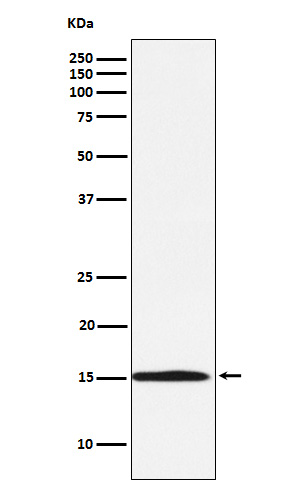
| WB | 1/1000-1/2000 | Human,Mouse,Rat |
| IF | 咨询技术 | Human,Mouse,Rat |
| IHC | IHC:1/100-1/200;IHF:1/50-1/200 | Human,Mouse,Rat |
| ICC | 1/50-1/200 | Human,Mouse,Rat |
| FCM | 咨询技术 | Human,Mouse,Rat |
| Elisa | 咨询技术 | Human,Mouse,Rat |
| Aliases | BLU; HEL-S-71; Ubc13; UbCH ben; UbcH13; UBCHBEN; Ube2n;;UBE2N |
| WB Predicted band size | 17 kDa |
| Host/Isotype | Rabbit IgG |
| Antibody Type | Primary antibody |
| Storage | Store at 4°C short term. Aliquot and store at -20°C long term. Avoid freeze/thaw cycles. |
| Species Reactivity | Human,Mouse,Rat |
| Immunogen | A synthesized peptide derived from human UBE2N |
| Formulation | Purified antibody in PBS with 0.05% sodium azide,0.05% BSA and 50% glycerol. |
+ +
以下是关于 **Ube2N/Ubc13 抗体** 的3篇参考文献及其简要摘要:
---
1. **文献名称**: *Lysine 63-linked ubiquitination promotes the formation and autoregulation of invasive actin networks*
**作者**: Wu-Baer, F., et al.
**摘要**: 该研究揭示了Ube2N/Ubc13通过催化K63泛素链形成,调控细胞骨架重组和侵袭性伪足的形成。研究中使用了特异性Ube2N抗体,通过免疫沉淀验证了其与TRAF6的相互作用,并证实其在乳腺癌细胞迁移中的作用。
---
2. **文献名称**: *RNF8-dependent histone modifications regulate nucleosome removal during DNA double-strand break repair*
**作者**: Huen, M.S.Y., et al.
**摘要**: 文章阐明了Ube2N/Ubc13与E3连接酶RNF8协同作用,催化K63泛素化以招募BRCA1等DNA修复因子。实验中通过Ube2N抗体进行染色质免疫共沉淀(ChIP),证实其在DNA损伤位点的泛素信号传导中的必要性。
---
3. **文献名称**: *Activation of the IκB kinase complex by TRAF6 requires a dimeric ubiquitin-conjugating enzyme complex and a unique polyubiquitin chain*
**作者**: Deng, L., et al.
**摘要**: 该研究证明Ube2N/Ubc13与TRAF6结合,催化K63泛素链激活IKK/NF-κB通路。通过Ubc13特异性抗体进行Western blot和敲低实验,揭示了其在炎症反应中的关键作用。
---
以上研究均利用Ube2N/Ubc13抗体验证蛋白功能,涵盖DNA修复、炎症及肿瘤迁移等机制。如需具体实验细节(如抗体货号),建议查阅原文补充材料。
Ube2N (also known as Ubc13) is a member of the E2 ubiquitin-conjugating enzyme family, playing a critical role in the formation of Lys63 (K63)-linked polyubiquitin chains. These chains are essential for non-proteolytic signaling processes, including DNA damage repair, NF-κB activation, and inflammatory responses. Ube2N functions as a heterodimer with Uev1A or MMS2. enabling the specific assembly of K63-linked ubiquitin chains that recruit downstream effectors like TAK1 and IKK complexes. Its involvement in key pathways, such as the TNF-α/NF-κB axis and error-free DNA repair, underscores its importance in maintaining genomic stability and regulating immune signaling.
Antibodies targeting Ube2N/Ubc13 are widely used in research to study its expression, localization, and interactions in various biological contexts. These antibodies are critical tools for techniques like Western blotting, immunoprecipitation, and immunofluorescence, helping to dissect mechanisms in cancer, neurodegenerative diseases, and immune disorders. For instance, Ube2N inhibition or knockout models show impaired NF-κB signaling and increased sensitivity to genotoxic stress, highlighting its therapeutic relevance. Validated antibodies ensure specificity for distinguishing Ube2N from other E2 enzymes, aiding in the exploration of its dual roles in promoting cell survival (via DNA repair) or pathological inflammation. Researchers rely on these reagents to investigate Ube2N's contributions to diseases and its potential as a drug target.
×